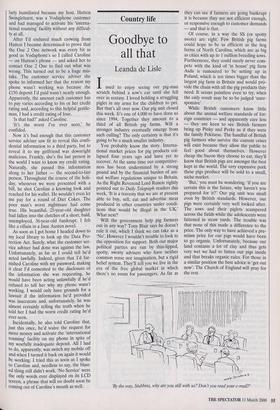Country life
Goodbye to all that
Leanda de Lisle
Iused to enjoy seeing our pig-man scratch behind a sow's ear until she fell over in ecstasy. I loved holding a struggling piglet in my arms for the children to pet. But that's all over now. Our pig unit closed this week. It's one of 4,000 to have done so since 1994. Together they amount to a third of all British pig farms. Will a stronger industry eventually emerge from such culling? The only certainty is that it's going to be a much smaller industry.
You probably know the story. Interna- tional market prices for pig products col- lapsed four years ago and have yet to recover. At the same time our competitive- ness has been undermined by a strong pound and by the financial burden of ani- mal welfare regulations unique to Britain. As the Right Reverend Lord Runde rightly pointed out to Daily Telegraph readers this week, 'It is a travesty that we are at present able to buy, sell, eat and advertise meat produced in other countries under condi- tions that would be illegal in the UK.' What next?
Will the government help pig farmers out in any way? Tony Blair says he doesn't rule it out, which I think we can take as a `No'. However I wouldn't trouble to look to the opposition for support. Both our major political parties are run by thin-lipped, spotty, swotty advisers who have neither common sense nor imagination, but a rigid belief system. They'll tell you we live in the era of the free global market in which there's no room for passengers. As far as they can see if farmers are going bankrupt it is because they are not efficient enough, or responsive enough to customer demands — and that is that.
Of course, in a way the SS (or spotty swots) are right. Few British pig farms could hope to be as efficient as the hog farms of North Carolina, which are as big as cities with up to 1 million breeding sows. Furthermore, they could surely never com- pete with the kind of 'in house' pig farm Asda is rumoured to be setting up in Poland, which is ten times bigger than the largest pig farm in Britain and would pro- vide the chain with all the pig products they need. It seems pointless even to try, when the only result may be to be judged 'unre- sponsive'.
While British customers know little about the animal welfare standards of for- eign countries — and apparently care less — they are keen to see British farmers bring up Pinky and Perky as if they were the family Pekinese. The handful of British pig farmers who survive the current crises will exist because they allow the public to feel good about themselves. However cheap the bacon they choose to eat, they'll know that British pigs are amongst the best kept in the world. The very expensive pork these pigs produce will be sold to a small, niche market.
But,' you must be wondering, 'if you are certain this is the future, why haven't you prepared for it?' Our pig unit was small even by British standards. However, our pigs were certainly very well looked after. The sows and their piglets scampered across the fields while the adolescents were fattened in straw yards. The trouble was that none of this made a difference to the price. The only way to have achieved a pre- mium price for our pigs would have been to go organic. Unfortunately, because our land contains a lot of clay and thus gets very wet we had to fatten our pigs inside and that breaks organic rules. For those in a similar position the best advice is 'get out now'. The Church of England will pray for the rest.
By the way, Stubbins, why are you still with us? Don't you read your e-mail?'


































































 Previous page
Previous page